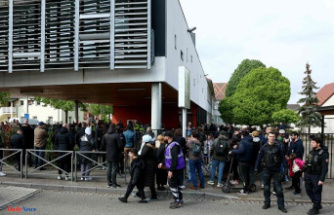There are many parks and playgrounds in the area, which makes it bustling. The local real estate market is thriving.
However, beneath the facade of normalcy, there are deep scars from years of rocket fire.
As a kind of museum, metal rocket fragments can be seen outside the main police station. A small concrete bomb shelter is located next to every park and bus stop. It's often decorated with street art and colorful murals. A few hundred meters (yards), from a new apartment building is an Iron Dome missile defense battery.
Residents of Sderot claim they are prone to jumping at the slightest sound. Parents have reported that their children are still wetting their sheets or too afraid to go to bed alone.
Noam Biton claims she had a normal childhood in Sderot. The 16-year old high school student admits it hasn’t always been easy. One of her most vivid memories was the sound of an air-raid siren while she was attending a bar mitzvah party on a quiet day.
She said, "We laid on the ground, three people." "The only thing that protected us was a vehicle," she said. The rocket flew nearby and sprayed shrapnel throughout the area.
Biton is outgoing and active in her local Scout troop. She says that she always makes sure to sit next the door whenever she rides the bus, just in case she hears an air-raid siren or needs to evacuate quickly.
Dvora, her mother, is a long-time resident. She says that uncertainty is a constant companion. She said, "It's sad that someone can control your life at any time." "We can't escape."
Israel and Hamas (an Islamic militant group that opposes Israel) have fought four wars over the years since Hamas took control of Gaza in 2007. This was one year after Hamas won a Palestinian election.
It is difficult to compare the conditions in Gaza with those in southern Israel. In the four wars that Israel has launched, some 4,000 Palestinians were killed, with hundreds more civilians. The Israeli strikes also caused severe damage to Gaza's infrastructure. Deep psychological wounds have left tens of thousands of people unable to flee this impoverished, blockaded territory.
Israelis now have a rocket defense system that protects them. They also have the option to temporarily escape rocket range. In addition, they have access psychological counseling and government support. Over 100 people died in four wars on Israel's side, and millions were forced to flee from rocket fire during fighting. Rocket fire can even erupt in quiet times without warning.
Sderot is a working class community located just 1.5 km (1 mile) from Gaza's border. It has been the hardest hit place in Israel by Palestinian rocket fire. Experts are still trying to determine the long-term impact of these rockets on children and parents who grew up in such a traumatic environment, two decades later.
Talia Levanon (director of the Israel Trauma Coalition) stated that "people who live in the south of Israel understand that it's just an issue of time until the next opportunity."
She said, "You're literally trying to heal from the previous time and prepare for the next one, which makes it very difficult."
Levanon's non-profit operates a number of "resilience centres" in southern Israel, which offer a range of services including counseling and workshops for families.
She said that nearly two-thirds (60,000) of the affected area residents were served by a resilience center during a brief violence outbreak in 2019.
Sderot's precarious situation was reaffirmed by the 11-day war in May between Israel and Hamas. According to the municipality, nearly 300 rockets were launched at Sderot. Despite the Iron Dome's protection, 10 rockets struck buildings directly -- one of which killed a 5-year old boy.
Residents of Sderot often use the term "resilience" to describe their community. Sderot seems to thrive in many ways.
It was once a backwater in Israel's Negev Desert. Now it is a vibrant town of 27,000 people. New apartment buildings and luxurious villas are popping up everywhere there is open space. It is connected to major cities by a fortified train station. Students from nearby colleges love the area's bars, restaurants, and shopping centers.
According to researchers, people who grew up in this area tend to stay there as adults out of pride and a close connection to the community.
Yaron Sasson is the spokesperson for the local government. He said that veterans and newcomers are attracted by tax breaks, generous government support, and the small-town atmosphere. He said that Sderot, at a time when most of the country is within rocket range, is considered relatively safe due to its bomb shelters, reinforced schools, and kindergartens.
According to the trauma coalition residents can suffer from many symptoms. Teens are more likely to be diagnosed with hypertension, aggression, and diabetes than those in other communities.
Adults can experience anxiety, depression, sleep problems, and general exhaustion. Researchers are only beginning to investigate the impact of growing up in Sderot upon young parents' ability to raise children. Another question is how Sderot's young people, who are often spooked at loud noises, can be trained to serve in the military. This is a mandatory rite of passage for most Jewish Israelis.
Dvora Biton stated that she always plans her route to get past the many bomb shelters in town when she drives out. The car window is always opened, the radio volume is low, and the pantry is stocked with canned goods. She will jump at any loud sound, even a popping ball.
She said, "It is something you think about 24 hour a day." It is something you can't escape, even when your sleeping.
15 years ago, just before the Iron Dome was invented, a rocket crashed outside Biton's family home leaving a small metal fragment in her front door. Biton had the metal fragment embedded in her front door for many years and only recently was able to take it out during a home renovation.
She said, "I wanted it to be there as a reminder of the unhealthy reality we live in." On the other hand, you feel the need to get rid of these things.












